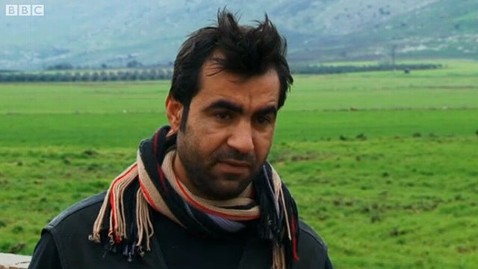Syrian Describes Surviving Firing Squad

BBC
Muhammed Ali lifts the leg of his track pants to show the scars of two bullet wounds from, he says, a failed execution attempt by forces loyal to Syrian president Bashar al-Assad. Three more bullets hit him in the ear, shoulder and hip, but he managed to survive and escape while the other 20 men lined up for execution by firing squad did not.
Ali is now one of the tens of thousands of Syrian refugees that have flooded into southern Turkey. He works behind the cash register of a gas station in a small town near the border with Syria.
He says he was stopped at a checkpoint near the city of Aleppo in August. It was manned by a pro-Assad gang, known as "shabiha." He was arrested and for three days, he says, he and the other prisoners were given no food or water. Then suddenly, they were told that they were being moved to another holding area but were instead driven to a deserted stretch of dirt.
"They put us all on our knees, all 21 of us," Ali told the BBC. "They began firing. I fainted when they shot at us. I woke up after 10-15 minutes and saw the gunmen's car leaving. And I saw everybody around me was dead."
There is no way to verify Ali's account, no video evidence has surfaced of the alleged firing squad. There is ample video footage online of both rebel and pro-Assad forces summarily executing members of the other side. Some particularly gruesome videos have been widely circulated of rebels decapitating people loyal - or suspected of being loyal - to Assad.
Ali's story comes amid accusations by NATO that the Syrian military fired an unguided ballistic missile toward cities in the north. The regime had previously been accused of firing SCUD missiles toward areas controlled by rebels.
The 22-month civil war shows no signs of letting up and talk of a political transition has gone nowhere. In a rare speech on Sunday, Assad said he is willing to enter into dialogue if the West and regional countries would stop supporting "terrorists," his catch-all term for rebel forces. Opposition figures rejected any talk of negotiations, reiterating that Assad stepping down a pre-condition for talks.
On Wednesday, the United Nations mediator tasked with finding a solution to the conflict, Lakhdar Brahimi, came the closest he has to calling on Assad to step down.
"In Syria, in particular, I think that what people are saying is that a family ruling for 40 years is a little bit too long," he told the BBC in an interview.
Syria's Foreign Ministry said Brahimi "overstepped his mandate and exhibited a flagrant bias for those parties known to be conspiring against Syria and its people."
Around 3 million people are believed to have been displaced by the fighting, half a million of them registered by the United Nations in neighboring countries. Harsh weather has wreaked havoc on the refugee camps, winter rain flooding tents and turning the dirt into rivers of mud.
Few are lucky enough to have a job like Ali, who now sleeps on the floor of a back room at the gas station where he works. The former tailor is trying to figure out what to do next, thankful his life didn't end last summer.
"In Islam, we believe that no one dies before their time," he said. "Perhaps this wasn't my time to die."